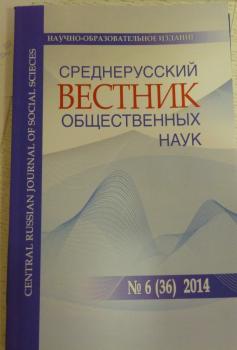The article presents an analysis of the results of the author´s empirical sociological study aimed at determining the place and importance of corruption in the system of social relationships of modern Russian society, as well as identifying features in the perception of corruption by the public group and individual consciousness. The peculiarities of corruption perception in the Russian society as a constant value are examined, which led to the transformation of this phenomenon from social anomie to the social norm, also correlation of corruption perception is analyzed as norms of behavior and age of the individual. The study of the social foundations of corruption of the Russian society and the formation of a coherent system of knowledge as a tool to change public consciousness and behavior of citizens will contribute to the development of activation mechanisms of civil society as a social resource of improving the efficiency of the state anti-corruption policy.
corruption, society, extent of corruption, indicators for assessing corruption in state institutions, the fight against corruption





